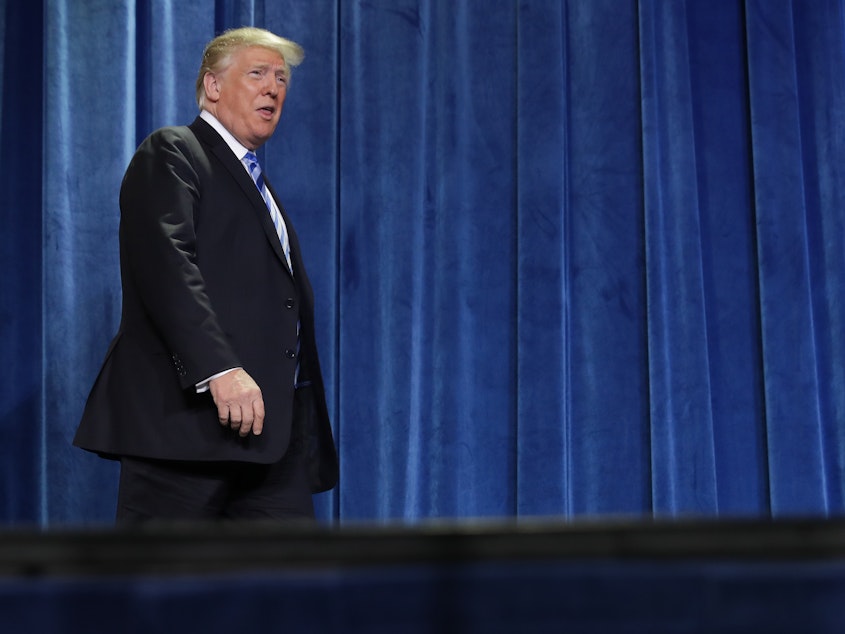Poll: Trump Seen As Important Factor In Americans' Vote, As Democrats Open Up Lead

This election really is about Donald Trump.
Roughly two-thirds of voters say President Trump is a factor (either major or minor) in their vote in this year's midterms, far more than said so in 2014 about President Obama, according to a new NPR/PBS NewsHour/Marist poll.
Don't see the graphic above? Click here.
Among women, though, it's even more acute — 51 percent of women overall said Trump will be a "major" factor in their vote in two weeks; 54 percent of suburban women said the same. Among those who said Trump is a "major factor," 64 percent said they were more likely to vote Democratic in November and 32 percent said they were more likely to vote Republican.
"This is definitively a national election — with a referendum on Trump," said Lee Miringoff, director of the Marist Institute for Public Opinion, which conducted the survey.
Sponsored
What's more, 47 percent of voters said their opinion of Trump makes them more likely to vote for a Democrat for Congress, while 34 percent said their opinion of Trump makes them more likely to vote for a Republican.
Compare that to 2014 when Republicans took control of the Senate. Obama had a somewhat lower effect on making voters cast a ballot for Republicans — with 41 percent saying then that their impression of Obama made them more likely to support a Republican and 38 percent saying their impression of the 44th president made them more likely to support a Democrat.
Democrats have also increased their advantage from 6 to 10 points compared to earlier this month on the question of whether people are more likely to vote for a Democrat or a Republican in their district. Democrats now lead Republicans on the so-called generic congressional ballot, 50-to-40 percent.
Driving that edge are independents, nonwhites and women, particularly suburban women and white women with college degrees.
Republicans lead with the familiar groups who drove Trump's election in 2016: whites without a college degree (particularly men), white evangelical Christians, rural voters and married men.
Sponsored
Trump's approval rating stands at 39 percent, down from 41 percent earlier this month. Trump's approval rating is hotly divided by party, but has remained fairly consistent through the nearly two years he's been in office.
Don't see the graphic above? Click here.
Miringoff added that if 2010 and 2014 were elections driven by men upset with President Obama, this is an election driven by women, particularly suburban women, and independents motivated to vote against President Trump.
Trump has just a 33 percent approval rating with women overall and a lower 27 percent approval with women who live in the suburbs. And 35 percent of independents say they approve of the job Trump is doing.
On the issues, the economy and jobs (at 20 percent) rated as the top issue of concern for voters, followed by health care and immigration (both at 17 percent). There were big differences in the priorities by party, however.
Sponsored
Democrats rated health care as the top issue (at 26 percent) followed by climate change (at 13 percent). Nothing else cracked double-digits. For Republicans, jobs and the economy took the top spot (at 30 percent) with immigration next (at 25 percent). Nothing else came close.
Republicans' tax cuts have turned out to be a liability for Republicans. Just 11 percent said it was the most important factor in their vote. A plurality of voters (45 percent) said the issue of tax cuts makes them more likely to vote for a Democrat for Congress in November while 39 percent said the issue makes them more likely to vote Republican.
What's more, when asked about how to reduce the federal deficit, 60 percent said it was better to roll back the tax cuts passed by Congress than to cut Social Security, Medicare and Medicaid — and that includes a plurality of Republicans.
Don't see the graphic above? Click here.
Even self-proclaimed "Trump supporters" were split on which was the better option.
Sponsored
That's a blow to congressional Republicans, especially Senate Majority Leader Mitch McConnell, R-Ky., who lamented the rising federal deficit, but blamed it on entitlements rather than tax cuts.
"It's disappointing, but it's not a Republican problem," McConnell told Bloomberg News Oct. 16. "It's a bipartisan problem: unwillingness to address the real drivers of the debt by doing anything to adjust those programs to the demographics of America in the future."
As NPR's Scott Horsley reported the same day, based on a fiscal-year-end report from the Treasury Department:
"The federal deficit ballooned to $779 billion in the just-ended fiscal year — a remarkable tide of red ink for a country not mired in recession or war.
"The government is expected to borrow more than a trillion dollars in the coming year, in part to make up for tax receipts that have been slashed by GOP tax cuts."
Sponsored
The poll was conducted from Oct. 21 through Oct. 23. Pollsters interviewed 935 Americans overall and has a margin of error of plus-or-minus 3.9 percentage points. Of those, 738 were registered voters and answers that refer to voters have a margin of error of plus-or-minus 4.4 percentage points. [Copyright 2018 NPR]



